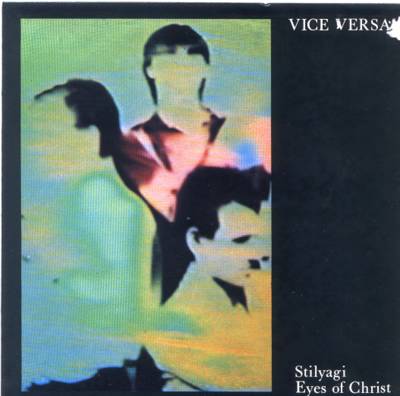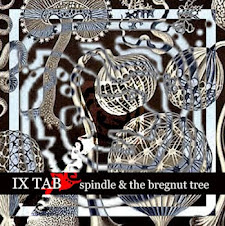Cut adrift from its Art-School roots, the Southern UK electronic underground has readily embraced The New Brutalism as its personal antidote to Nannystate Surveillance Culture. It's like Grime is sticking two fingers up to The Daily Mail by pretending to be a walking catalogue of everything that makes Middle England mess its pants: what, you don't like drug-dealing, binge-drinking, STD-infecting, car-nicking Thug-Culture? Well, coo-eee: here we are...
(The fact that it takes some serious intelligence and wit to program distorted beats that fucking sick (and to bust flows that are that confrontational and inflammatory) is probably lost on a lot of people, but, hey, never mind...)
Still, Nick's mention of Vice Versa suddenly got me all hot and frothy about Sheffield's almost-forgotten electrobeat pioneers. I was living in Bristol around '79 when I found a copy of this exercise in glacial electronic reportage:

Vice Versa made a virtue of their limited sound-pallette on this EP, bashing out a quartet of stripped-down, almost stark, ice-cold slivers of Seventies Futurism. Even though I was effectively living in the UK Capital of Punk-Funk (The Pop Group and The Glaxo Babies were playing frenzied iconoclastic concerts pretty much on a monthly basis...) the music coming out of Sheffield at that time made me wonder what they were putting in the water Up North: for a while I had visions of Nehru-collared androids going to work on Ditkoesque monorails. Someone on my course came from a village about 8 miles from Sheffield and when I asked him about the Sheffield 'scene', he said (something like): "Nowt but crap Metal bands up ar' way, lad..." Cue: sound of a slowly-deflating balloon....
The "Music 4" EP sets a course somewhere between early Human League and the relentless minimal percussive Fuhpizsssht of The Normal's debut single. There's some nice melodic touches too, lots of empty sonic space and some playful lyrical wit in evidence: "Riot Squad" magages to rhyme 'Quatermass' with 'tear-gas', and features a guest appearance from The Incredible Hulk. 'Camille' is a slab of frozen synthetic beauty; its lyrics supplied by a 'found' tape of earthquake survivors (aptly) describing scenes of urban desolation and collapse.
A letter to Neutron Records kicked-off a brief flurry of correspondence with band-member Mark White in which we discussed the merits of the Korg MS20. Unfortunately, I was an impoverished student at the time so all I could do was drool and fetishise over the analogue synths for sale in a shop in Park Street just down from the Wimpy. In wasn't until 1980, when I was finally in a reasonably well-paid paid job, that I could afford the drum-synth which started my own personal obsession with analogue-synthesis. Stupidly, though, I took the path of least resistance and joined a rock-group (of sorts) when maybe I should've been looking out for similar-minded synth-nerds in the South-West.
A year later, Martin Fry joined Mark White and Stephen Singleton to make the "Stilyagi" single:

Technically, it's a more accomplished record, but the vocals are far more singy, and the music lacks the frozen spaciousness and quirky robotic tics of their earlier stuff. Unsurprisingly, with Fry on board as lyricist, the trio took a less Electronic/more Pop-orientated path, hooked up with NME-writer Paul Morley as their unofficial publicist and eventually renamed themselves ABC. A demo reached the ears of Trevor Horn and Eighties Big Pop was born...
Still:
What bands like Vice Versa have in common with Grime is that they are as much about urban survival strategems as they are about music. The Art-School '70's electronic scene effectively negated the fear of an inceasingly technological world by actually aping its tropes and mannerisms ("I want to be a Machine", "Are Friends Electric?" etc)...they also took some lyrical and stylistic cues from Ballard and Burroughs, of course...and created a type of inverse cultural camouflage that, paradoxically, had the effect of making them more visible. The end-result was that they achieved some sort of negative polarity that marked them out and drew like-minded individuals in towards them.
Their ironic identification with The World That Was Coming also acted almost like a sort of innoculation: whereby introducing an antigen or irritant induces an immune-response that confers immunity on the individual. (Forgive the over-used viral analogy, but I'm a former microbiologist (now on wheels) so it's second nature to me...) By emulating the enemy you can often outwit it, or, at the very least, learn to use its own weapons and technology better than it can.
Of course, in the end, we lost the war. Blair's 'Slow-Lane' Neo-Conservativism is a softer, more subtle variant of the Ugly Spirit virus than Thatcher's...it seeks to smoother us with the very things we secretly desire while claiming that it just wants to protect us from outside evil "for our own good". It is an extremely virulent form of 'benign' Fascism that wants to eradicate smoking, obesity, loutish behaviour for the common Corporate Good.
Blairism is darnright sneaky; it eshews direct confrontation and seeks to gently guide its citizens into its slippery slipstream. New Labour don't like fights, because they're a bunch of middle-class media-literate pussies who are scared of getting their noses bloodied...
So it's interesting to me to see how Grime is mutating into a two-fold path of reistance: Bashment is gobby; it's directly confrontational and in yer face: a deliberate manifestation of every New Middle-class Jeep-owning suburban fear ever conjured up by The Express and The Mail. Bashment says exactly what's on its mind in the same way that Punk did, but there's the the added sting that maybe this is the Real Deal: drug-dealing working-class hoodlums, not nice white boys playing at being weekend punk-rockers: these guys really mean it (maaaaan)...this time they've got nothing to lose; they've got guns and they're not scared to use them. The fact that, in a lot of cases, most of this is role-playing on a cartoon level comparable to Gangsta Rap or Old School Metal is by the by...it has an anger and an almost-terrifying intensity that I would argue hasn't been seen in music since the Late Seventies. On a superficial level Grime is apolitical, but my gut-feeling is that it has evolved as a direct response to the homogenised neo-middle-class plateau that a major chunk of our society is slowly being herded onto. Orwell’s Big Brother may have turned up twenty years late wearing chinos and smiling, but Grime looks Babylon straight in the eye and says: Come and have a go if you think you’re hard enough…
Grime's second evolutionary thread is Dubstep which adopts a stealth strategy similar to the Sheffield Synth Pioneers in that it attempts to emulate the mechanisms of surveillence and subtle 21st century persuasive oppression. Dubstep is the sound of CCTV cameras whirring; the ominous, insect-like drone of police helicopters filming anti-war protests; the brooding soundtrack of inner-city unease. Unlike Bashment (or the music of, say, Mark Stewart), it is non-confrontational; it is pure aural reportage; a direct and wholly-acurate documentation of The Now. Look around you: (that clanking off-kilter rhythm...) that's our world; that's how our lives sound when you pick off the scabs and look beneath the surface...
Only us Brits could create a form of music that actually seems to celebrate urban paranoia. Even the crews have appropriated the terminology of Counter-Terrorist SWAT teams: Terrah Danjah, Black Ops, Ruff Squad...
Like Vice Versa, Grime has partially adopted the enemy's mannerisms; clad in the darkest, most vicious irony, it both mimics and mocks them; it innoculates and strengthens us; it hints at their weaknesses and warns us; it provides us with strategies and options. It stubbornly refuses to go overground and become commodified, to be absorbed into the Corporate Overbody and spat out as bubblegum product like Punk into New Wave or Acid House into Superclub Trance.
Dubstep seems passive. Don't be fooled: It is not.
Bashment might seem vulgar and dumbed-down. It is neither.




















5 comments:
Awesome post, kek. It chrystallizes all the vague feelings I have into sharp focus. I feel priveliged to have read it.
The new Mark One/Virus Syndicate album is the Next Level - combining all the strongest Bashment and Dubstep traits you describe into a unified statement of malcontent. A bit heavy on the mysogyny in places, though...
Loki - doncha think that Vica Versa cover looks like the classic Milgram handout diagram?
yeah it does...i'd imagine it's a thinly veiled commentary on the essentially 'agentic' state of the human / machine interface...man faced with the arbitrariness and unpredictability of circuity and sound.
or else, it's just Not
very nice work!
I am truly impressed that someone out there made at least this minor feature on a band that was, for most of its time, unfairly underrated - couple of years ago Vice versa were almost released on CD but due to impossible tracking of the master tapes, the whole thing was cancelled. According to such sad fact, all i could possibly do is collecting their catalogue in its obscure entirety - which means, horribly hard to find 7" EPs and a cassette that was so obviously recorded from tape to tape affecting every next copy with a double hiss...
Now that we're analysing work by the group that made no relevant impact alone, Vice Versa's electronic 'pop' vocabulary always seemed far more structured and carefully prepared - The Human League were popular and made it bigger but compare 'Reproduction' or 'Travelogue' with 'Music 4' or 'Genetic Warfare' from '1980: The First Fifteen Minutes' and see just how dated The Human League sound. Lost between subverting rock with a synth, The League albums now seem unfinished... Vice Versa, on the other hand were often accused of being pretentious - however, they were just perfectionists. Just direct, plain and simple. Yes, 'Camille' is a piece of ultimate synthetic beauty - ironic for the fact Vice Versa were quite harsh in their sound assault. Really hard to imagine a group of people that later recorded 'The Lexicon of Love', wearing gold-lame suits to be as abrassive for the time, owing more to a certain Clock DVA or Cabaret Voltaire than any comparison to The Human League. Also talk about packaging - neutron was probably a typical aesthetic demonstration, sadly the one that didn't survive the commercial opportunity many others (like 4AD, Mute, Rough Trade, etc) did... Warp Records' founder Steve Beckett mentions Vice Versa as part of his walkman soundtrack during the Now Soc days... Well, I wonder - Vice Versa were probably the first true catchy Warp informers...
Post a Comment